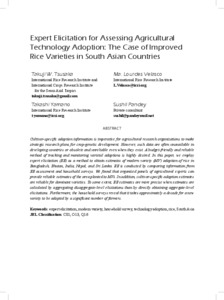Expert Elicitation for Assessing Agricultural Technology Adoption: The Case of Improved Rice Varieties in South Asian Countries
Abstract
Cultivar-specific adoption information is imperative for agricultural research organizations to make strategic research plans for crop-genetic development. However, such data are often unavailable in developing countries or obsolete and unreliable even when they exist. A budget-friendly and reliable method of tracking and monitoring varietal adoptions is highly desired. In this paper, we employ expert elicitation (EE) as a method to obtain estimates of modern variety (MV) adoption of rice in Bangladesh, Bhutan, India, Nepal, and Sri Lanka. EE is conducted by comparing information from EE assessment and household surveys. We found that organized panels of agricultural experts can provide reliable estimates of the area planted to MVs. In addition, cultivar-specific adoption estimates are reliable for dominant varieties. To some extent, EE estimates are more precise when estimates are calculated by aggregating disaggregate-level elicitations than by directly obtaining aggregate-level elicitations. Furthermore, the household surveys reveal that it takes approximately a decade for a new variety to be adopted by a significant number of farmers

